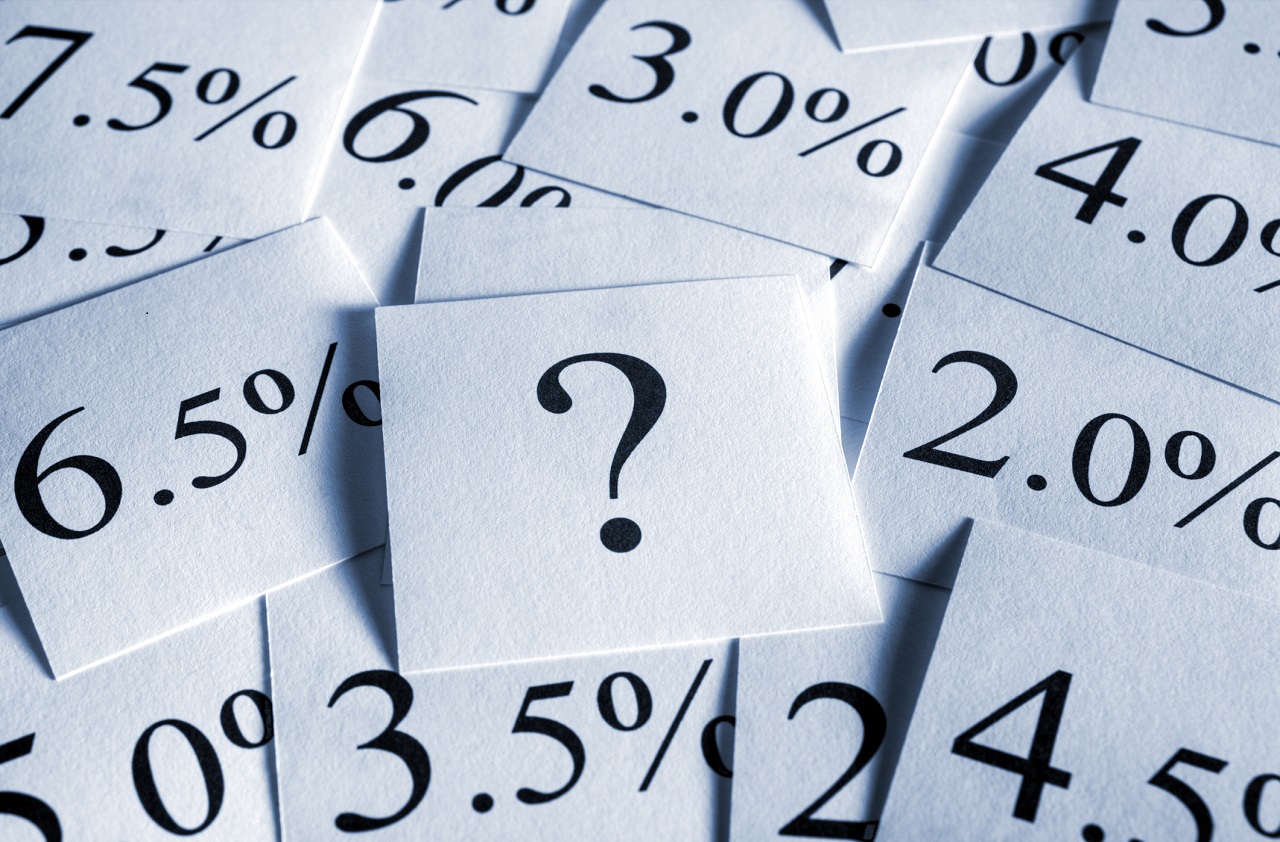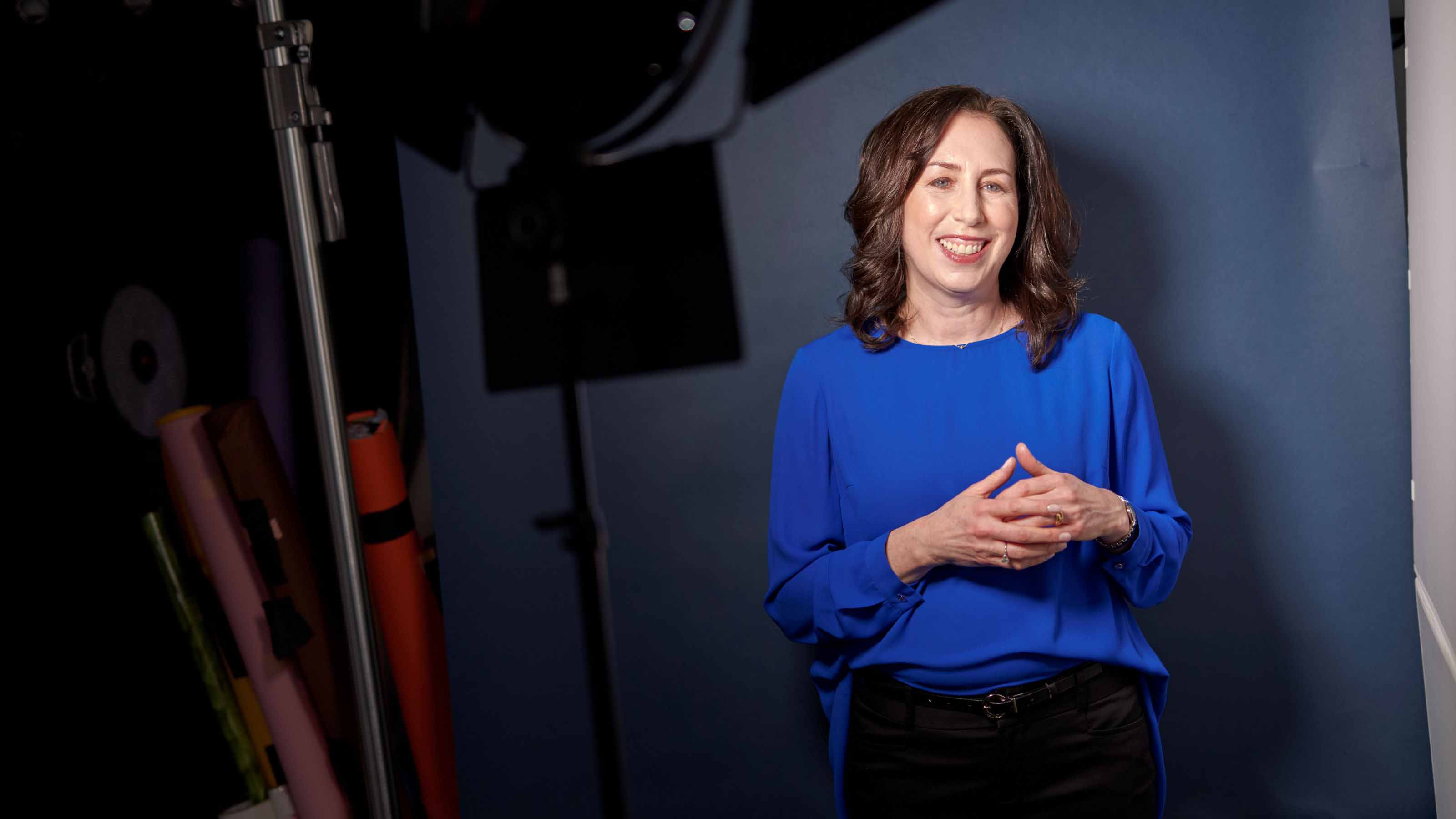Interest Rates . . . and YOU!
Sandy and Ryan interview senior associate editor (and investing maven) John Waggoner on all things interest rates. Plus, the hosts come up with ways for you to avoid surprise fees during holiday travel and Sandy explains to Ryan, like he’s 5, the ins and outs of traditional and Roth 401(k)s.

Profit and prosper with the best of Kiplinger's advice on investing, taxes, retirement, personal finance and much more. Delivered daily. Enter your email in the box and click Sign Me Up.
You are now subscribed
Your newsletter sign-up was successful
Want to add more newsletters?

Delivered daily
Kiplinger Today
Profit and prosper with the best of Kiplinger's advice on investing, taxes, retirement, personal finance and much more delivered daily. Smart money moves start here.

Sent five days a week
Kiplinger A Step Ahead
Get practical help to make better financial decisions in your everyday life, from spending to savings on top deals.

Delivered daily
Kiplinger Closing Bell
Get today's biggest financial and investing headlines delivered to your inbox every day the U.S. stock market is open.

Sent twice a week
Kiplinger Adviser Intel
Financial pros across the country share best practices and fresh tactics to preserve and grow your wealth.

Delivered weekly
Kiplinger Tax Tips
Trim your federal and state tax bills with practical tax-planning and tax-cutting strategies.

Sent twice a week
Kiplinger Retirement Tips
Your twice-a-week guide to planning and enjoying a financially secure and richly rewarding retirement

Sent bimonthly.
Kiplinger Adviser Angle
Insights for advisers, wealth managers and other financial professionals.

Sent twice a week
Kiplinger Investing Weekly
Your twice-a-week roundup of promising stocks, funds, companies and industries you should consider, ones you should avoid, and why.

Sent weekly for six weeks
Kiplinger Invest for Retirement
Your step-by-step six-part series on how to invest for retirement, from devising a successful strategy to exactly which investments to choose.
Ryan: Are you interested in interest rates? We sure hope so. The way they move affects not only the economy, but your portfolio as well. Kiplinger's senior associate editor John Waggoner joins us to tell you how in our main segment. On today's show, Sandy and I tackled the sneaky fees that crop up during holiday travel, and I get in touch with my inner child in a discussion about retirement accounts. That's all ahead on this episode of Your Money's Worth. Stick around.
- Episode Length: 00:30:27
- Links and resources mentioned in this episode
- SUBSCRIBE: Apple Google Play Spotify Overcast RSS
Ryan: This is Your Money's Worth. I'm Kiplinger staff writer Ryan Ermey. She's senior editor Sandy Block. And Sandy, I'm going to try and switch up the intro. A lot of people like to travel over the holidays and, increasingly these days, travel means hidden fees.
Sandy: That's right, Ryan, and I was made very much aware of this this past weekend when I flew to Detroit for a wedding. Fortunately, we get a break on our bag fees because we have a branded credit card. Otherwise, we'd be paying probably $25 to check our bags, which I really like to do, because otherwise you end up getting into brawls on the airplane with other people trying to stash their stuff in the overhead compartments.
From just $107.88 $24.99 for Kiplinger Personal Finance
Become a smarter, better informed investor. Subscribe from just $107.88 $24.99, plus get up to 4 Special Issues

Sign up for Kiplinger’s Free Newsletters
Profit and prosper with the best of expert advice on investing, taxes, retirement, personal finance and more - straight to your e-mail.
Profit and prosper with the best of expert advice - straight to your e-mail.
Ryan: Right. So let's talk about that for one second. Baggage fees are on the rise. At most major airlines, they're going to be charging you for checked bags and then on some budget airlines, they're going to be charging you even for carry on bags. And so when you're searching for a flight, it pays to use a site like Kayak or Google Flights that allows you to toggle on features that will let you compare flights based on the total price, including those bag fees.
Sandy: That's right. And another fee that these sites may be able to flag for you, which we ended up paying, is a fee to get a specific seat. A lot of airlines now will charge you extra to give you a seat assignment. Now, you can waive that fee, but there's a very good chance that you'll end up in the middle seat between two linebackers when that happens.
Ryan: Right.
Sandy: Or worse, the flight that I was on coming home was way overbooked and you know the first people who are going to get bumped, not for a lot of money, are the people who don't have a seat assignment. So I think this is a fee that is annoying, but probably worth it in some cases. You just have to factor that in when you're figuring out how much this flight is going to cost.
Ryan: Right. And you mentioned a branded credit card, and that's probably not something that's going to help you when it comes to your seat assignments, but like you said, it really can help you when it comes to bag fees. So if you like flying Delta for instance, it may make sense to get, say, the Amex Gold Delta Sky Miles card. That way, when you purchase flights with that airline through that card, you can waive your bag fees.
Sandy: That's right. Some of these branded cards do have annual fees, but oftentimes if you just fly twice with your spouse or kids or whatever and check your bags, it will pay for those fees, so it's worth it. Again, you got to do a little math, but I think that this is a fee that you can't avoid.
Ryan: And the only other really, really avoidable fee for airlines, a lot of them charge a booking fee or some people call it a person fee. Basically, if you have to talk to a real person to book a ticket, like call them up old school and book a ticket, you get charged extra.
Sandy: That's right.
Sandy: Shout out to the guy who we can't remember.
Ryan: He's like the Anthony Bourdain of hotels. It's like Hotel Confidential. Anyway, he gave me a fantastic rule. It's a little bit off the books for Kiplinger's. I think it actually did make it into the magazine, but it's a little bit sheisty. So let's say you're going home for the holidays, you were planning on staying at the hotel, but you know, things open up and you decide, all right, we're going to stay with the in-laws. Most hotels will charge a cancellation fee if you cancel too close to your reservation. So here's the trick.
Ryan: You call and say, "Listen, the conference I was supposed to go to, it got moved back by a month. Could you just move my reservation back a month please? Thanks so much." They move it back, then call at a different time of day to make sure you get a different person and cancel it and avoid that cancellation fee. Really, I'll put that article in the show notes because there's all kinds of stuff in there. I don't know if this made it into the article, but he's like, "Never pay the minibar fee. Just tell them that you didn't use it and they'll start taking it off before you even given an explanation."
Ryan: So when you traveled to Detroit, did you guys rent a car?
Sandy: No, I've got a million relatives in Detroit so we always get a ride.
Ryan: Well, so, but there are some fees associated with rental cars?
Sandy: Yes, and that's really where a lot of times the rate that you book is not anywhere near what the rate that you end up paying.
Ryan: So yeah, one of the really common ones is the airport fee or the airport tax. You're going to pay more to pick up and drop off the car you get from the airport. So once again, you're going to have to do a little bit of our dreaded math, but it may be cheaper to rent from a place off the airport premises outside of a certain radius that charges that fee or that tax. There might be a shuttle to a lot that you can go to and if not, it's still might pay to take a cab out there.
Sandy: Right, and then you aren't paying the airport fee, and if you're like me and you've got a million relatives, maybe you can get them to drive you to it, but it's certainly worth checking out because rental cars can really add up, and anything you can do to cut the cost is going to really add to your bottom line.
Ryan: Well, yeah, and the other thing that adds up is the various coverages that they offer.
Sandy: Right, and that's something that you should check out way ahead of time because some of your insurance may be covered by your credit card if you use that credit card to rent the car. Some of it may be covered by your own car insurance policy, but there are things that may not be covered and you certainly don't want to find that out after you have an accident. So I would say this is something you should probably sit down with before you go to the counter because they're going to try and sell you every kind of insurance plan that they have.
Ryan: That's right. So for the sort of the collision damage waiver, that's one that your credit card may cover some of it, your personal car insurance may cover some of it, but that CDW, as it's called, may also cover fees that your policy and your credit card may not, such as loss of use fees. So that's something that we think that people should consider. As for liability insurance, check your auto policy. If it extends to vehicles you don't own, you're probably covered.
Sandy: And the last thing we wanted to talk about, Ryan, I understand you're planning a trip overseas during the holidays. What should people be looking for in terms of foreign transaction fees?
Ryan: Yeah. So there are really sort of two things to be on the lookout for if you're traveling abroad. I am going to Madrid and Lisbon over New Year's. I'm going to party. So if you're looking to take out cash abroad, your bank may charge you two or three bucks per withdrawal and who wants to pay that? So it's worth considering opening a small bank account if you want at Capital One. Capital One 360 accounts, Charles Schwab, they'll waive the fee.
Ryan: In terms of transaction fees for credit cards, you may be charged one percent to three percent in foreign transaction fees and that's something that we want to avoid as well. So there are a few cards that will waive that fee for you. Any Capital One card, any Discover card, those are ones that people talk about all the time. And the Barkley Card Arrival Plus, which is a Mastercard, I think that waives those fees as well.
Sandy: Okay. That sounds good, Ryan. Have fun in Madrid.
Ryan: Oh, you have no idea. When we come back, one of Kiplinger's market mavens breaks down the ins and outs of interest rates. Don't go anywhere.
Ryan: Before we get into our interview with John, a quick programming note. Since recording, Kiplinger's is now projecting two interest rate hikes for 2019 instead of three. With that in mind, enjoy the podcast. Welcome back. We're here with senior associate editor John Waggoner who like myself writes about investing here at Kiplinger's Personal Finance magazine, and today we're talking about interest rates. Thanks so much for coming, John.
John: Hey. Thanks for having me.
Ryan: So just as a reminder to listeners, the Federal Reserve controls short-term interest rates and most people know that they've been gradually on the rise. What do rising rates mean for investors, savers and borrowers, John?
John: Well, the Fed has been raising short-term interest rates from 0 in 2015 to a still pretty darn small two and a quarter now. We expect they'll hike another quarter point later this month. For savers and borrowers, it means actually earning some money on their cash. For investors, it means that stocks will have more competition from bonds and bank CDs. Stocks hate competition.
Ryan: So why is the Fed raising rates now and what do we expect them to do in 2019? Do we expect the rate heights to continue?
John: Well, the Fed is raising interest rates now for two reasons. First, wants to make sure that the economy doesn't overheat and produce spiraling inflation, and it wants to be able to have some ammo to stimulate the economy in the next downturn. Kiplinger's expects another three hikes in 2019, but Fed chair Powell recently noted that he thinks rates are pretty close to their target. So we may revisit that as new data when the economy rolls in.
Sandy: So John, what is the current interest rate picture mean for the market and the economy as a whole? It sounds like you're saying it's not good for the stock market.
John: Well yeah. Generally speaking, higher rates means that companies will pay more for their loans which effectively reduces their profits, and that means less investment in people, plants and equipment. Similarly, it means that individuals have to pay more for loans from credit cards to mortgages. In the past 12 months, the rate on a 30-year fixed mortgage has gone from 3.9% to 4.81%, making housing less affordable.
Sandy: So that sounds like it's not great for people who borrow money. People who save money, it sounds like it's better if they're saving in safe places. John, with all this talk about rising interest rates, what should people be doing with respect to their portfolios? What kind of adjustments should we be making?
John: Well, the weird thing about the current environment is just how flat rates are. Normally if you lock up your money overnight, you get a lower return than if you locked it up for like five years. But right now the difference between locking up your money for 2 years and locking up your money for 10 years is about a tenth of a percentage point. So it really is to your advantage to keep your maturities very short. In fact, you can probably do just as well as a money market savings account or a money market fund as you could with a two or a five-year CD. So you may as well keep rates short and that way if rates do rise, you can reinvest later at a higher rate.
Ryan: So just to clarify a couple things that we talked about there. So when you say that rates are flat, that means there's not very much difference between a short-term and a long-term rate because typically you're going to get paid more for locking your money up longer. But right now that doesn't seem to be the case.
John: That's absolutely correct. Again, one of the things you should think about is that if you're considering say, a choice between a bond fund which moves up and down with interest rates and a money market fund which doesn't, you might consider that a money market fund will preserve your assets, give you some interest and not go down and up and a bond fund will. You shouldn't throw out all your bond funds because they have a good part in a diversified portfolio. But right now given the choice, cash looks pretty appealing.
Ryan: Right. That flatness that we talked about, that's really ... We talked about the yield curve. So a normalized yield curve has a gap between the short-term rates and the long-term rates, flat means that they're pretty close. And there's another version that we're sort of headed toward that's called an inverted yield curve. What's that about?
John: Well, an inverted yield curve just means that you'll get more interest in say a two-year treasury note than you would in a 10-year treasury note. Wall Street looks at that as a very bad omen, kind of like saying Bloody Mary three times in front of a mirror. It almost always presages a recession. It doesn't guarantee it but it's a bad sign. It means that people think that you should be rewarded more for keeping money in the short-term than in the long-term. They feel like things are more dangerous in the short-term than they are in the long-term.
Sandy: So John, it sounds like even though we don't have an inverted yield curve now, the fact that rates are flat, has that raised concerns that we are heading into a recession?
John: Yeah. It means that, first of all, we're pretty darn close. It wouldn't take much to knock us into inverted yield curve. It also means that as the long end falls, rates and long end fall, that means that traders are worried that the economy is going to slow down. When the economy is really hot, rates rise because people can demand more money for their loans. When rates fall, they cut rates to try to attract borrowers and that seems to be what's happening now.
Ryan: So shifting gears a little bit. We talked about what this might mean for people who watch the market, but what about you know sort of everyday people? I've had the same bank account since college, it's in my same Bank of America account with checking savings. I took it out ... I went to college in 2009 and so this was back when interest rates were practically nothing and I feel like I'm still earning practically nothing.
John: Yeah. You probably are and most people probably are too and banks really like that. In fact, I looked at my interest-bearing checking account and I think I've earned 14 cents in the last 3 years, which I believe is entirely taxable. So that's really a bad deal. But you can go online and get much better deals from online banks. They save money because they don't have a brick-and-mortar presence, they don't have to pay tellers. You can get like two and a quarter for a money market account, which is a really good deal. You can take your money out at any time, it's FDIC insured. And if you want to go out a little longer, maybe one year or two year, you might be able to get close to 3%. But I wouldn't go out any longer than that. You don't get paid much more and if rates continue to go up and you have a shorter term investment, you can rollover at a higher rate later.
Sandy: Ryan, in our December issue we've got some lists of top yielding savings accounts and CDs, and we show that some one-year CDs, again, this is mostly online, you can earn up to 2.7% on some savings and money market deposit accounts. Some of these online banks are paying 2.5% or more. These are accounts that are FDIC insured, so you're getting no risk when you invest in them. You just have to be proactive. Banks count on you to be lazy and they make a lot of money off of inertia. But if you're willing to set up the account and move some money, you could make several hundred dollars a year depending on the size of your account for absolutely no risk. So why not do that?
Ryan: Exactly. Right. Why not do that and frankly I feel a little bit seen. John, just sort of wrapping up. I think interest rates come across your financial tickers on CNBC or whatever all the time. What should people be sort of watching out for when they're looking at interest rates and how should they be reacting?
John: Well, there's two components to rates. The first is a Federal Reserve and you should watch their movements like a hawk. It's a big deal when they come out with their minutes of their meetings and when they announce a new interest rate hike or if they don't. People watch the minutes of the Fed kind of like people used to watch who was standing on the parade ground at a Russian military parade. They parse it really carefully. You can look at some very good commentary on that. If the Fed seems intent on keeping a rate hike campaign going, then you should stick with your shorter term investments with your money funds, one-year CDs really at the most because you'll get more in the next year or so.
John: On the other end is the bond market. They're basically ... They're only happy when it rains, okay. The bond market makes money when the economy goes into a downturn and that's when rates fall. So if rates keep falling, if the 10-year rate keeps falling, 10-year treasury rate keeps falling, that means that the general consensus on Wall Street is that the outlook is not very good. Then you should be thinking about what your other investments are doing. Stocks don't like that kind of environment. The only environment that really does well in a falling rate environment, long-term rate environment are bonds. But if rates keep going up, it means the economy is happy, people are worried about inflation which is something that happens only in a very active robust environment, then you can really look more at stocks than bonds.
John: But keep an eye on both of those. Keep an eye on the Fed, keep an eye on long-term rates. Basically, the higher the short-term rate goes, the more Feds try and put brakes on the economy. The lower the long-term rates goes, the more the bond market thinks that the Fed is going too far.
Ryan: All right. I've got a marching orders. You satisfied, Sandy?
Sandy: Yes, I am.
Ryan: Alright.
Sandy: I'm going to pay off my credit cards.
Ryan: Thanks, John. When we return, I go back to kindergarten for an explainer on retirement accounts. To find out what on earth that means, stay tuned.
Ryan: Alright, before we go, we wanted to introduce a new segment. I was talking with my roommate about the last episode, which everyone should go back and listen to, but we did a segment on FSAs, and I was telling him about it, and he said "What's an FSA?" I said "Like a flex account, like ... ." He said, "Well, what's that?"
Ryan: And I thought, on a semi-regular basis, we should do ... On Reddit, they call it "Explain Like I'm Five", just a basics segment. And we'd like for it to eventually be a mailbag segment. So if any of you listeners out there have financial questions that you were afraid to ask because you thought that they were too basic, send them in to podcast@kiplinger.com. But in the meantime, I blasted out a question to all of my ... Group chat of all of my New Jersey goon friends, and said "What do you want to learn about personal finance?" And you, too, might get on the podcast.
Ryan: The best one that we got was, what's the difference between a Roth 401(k) and a traditional 401(k)? So, in this scenario, I am going to be the five year old, with a very deep voice for a five year old, I know.
Sandy: And a beard.
Ryan: And a beard. But, Sandy, you're going to explain to me like I'm five. So, what is a 401(k), just in general?
Sandy: Well, a 401(k), in general, is the most popular way, and the easiest way to save for retirement. Every paycheck, a certain about of your pay goes into an account, pre-tax, that is invested for your retirement. Most companies match that contribution, and it's not taxed, so it lowers your taxable income, and if you start early, it grows and grows, and hopefully you can retire in comfort.
Ryan: So how does a traditional 401(k) work? And how does that differ from a Roth 401(k)?
Sandy: A Roth 401(k), which is a fairly new product, is like a 401(k) with one big difference. Your contributions are after tax, so you're not going to get this big, immediate tax break from putting money in a Roth 401(k). But just as the case with a traditional Roth, which you would typically invest in on your own, this money grows tax free, earnings grow tax free, and as long as you wait until you're 59 and a half to take it out, and you've had the account for five years, all of your withdraws are ... And all of the earnings you've piled up, are never taxed.
Ryan: So, in that case, who might benefit most from using a Roth 401(k)?
Sandy: Well, there's lots of people who would benefit. A lot of financial planners say that young people actually stand to benefit the most, because when you're young ... For two reasons. One is, the tax break you get from a traditional 401(k) isn't as valuable if you aren't making a lot of money, 'cause if you're not making a lot of money, your tax rate isn't very high.
Ryan: Right.
Sandy: So, the tax break isn't as valuable to you. But the other big advantage is, you're young, so you have all these years for that money to grow, tax free. The IRS doesn't touch it, and will never touch it, so you get the real benefit of time, and tax free growth, so when you retire, you don't have to worry about paying taxes on that money.
Ryan: So it sounds, to my five year old brain, that you're going to make more money over the long term with a Roth because it's growing tax free. Are there people that would be better off sticking with the traditional kind?
Sandy: Sure, and in fact, we recommend ... You can't double dip. You can basically invest up to $19,000.00 in a 401(k), or %25,000.00 ... This is in 2019, if you're over 50. We recommend a little dividing it up. If you have the option, and not all companies offer Roth 401(k), but if you have that option, we recommend putting some in both because the tax break really is nice. I do our own taxes, and I really am very aware of the benefits of having this amount that we've put in our 401(k)s, right off the top. It also lowers your adjusted gross income, and that could qualify for things that you want.
Sandy: For example, if you're just on the threshold for qualifying for a subsidy for health insurance through one of the Affordable Care Act exchange, putting money in a 401(k) could get you down low enough that you get the subsidy. There's all kinds of other tax breaks and advantages that are tied to your adjusted gross income. So in that case, putting at least some of your money in a 401(k), will really pay off.
Sandy: I think you split the difference. Put some in a Roth 401(k), so you get those benefits of tax free growth, and put some in a regular 401(k), so you get the advantages of the tax break right now.
Ryan: Right, so for a regular, traditional 401(k), it's basically like you can shave money off the top of what you're making now?
Sandy: That's right, and for a lot of ... Especially now, when most people are going to claim the standard deduction, this is the only really major tax break that a lot of people will get, and it's the easiest one to claim.
Ryan: But over the long term, let's say I'm not five, let's say I'm 25. If I'm trying to grow my money as best I can, I should probably be in a Roth, right?
Sandy: Yeah, at least some in a Roth. Because one of the things we talk about a lot, is we talk all this time about diversifying the investments in your portfolio. But tax diversification is valuable, too. And that's what putting some money in a Roth 401(k), some money in a regular 401(k), will give you that tax diversification, which you will want when you retire.
Ryan: Well that all sounds great, but not everyone's like my friend from Jersey. What if your employer doesn't offer a Roth 401(k)?
Sandy: That's the problem, these are fairly new products, and a lot of employers, especially small ones, don't offer them. But there's nothing to stop you, unless you make too much money, which then the thresholds are pretty high, from investing in a regular Roth IRA. That's basically a Roth that you set up yourself, that you fund through a brokerage firm, or a mutual fund company. Has the same advantages, you can't put as much as you can in a Roth 401(k), but you can put in several thousand dollars. And again, that money will grow tax free, until you retire. And the really nice things about regular Roth IRAs, is that you can always withdraw the amount of your contributions, without paying taxes or penalties. You shouldn't, you should let that money grow for retirement, but you can withdraw the amount of your contribution at any time, if you have an emergency.
Sandy: And that's a nice perk to these accounts that other types of retirement savings plans don't offer. Certainly, if you don't have a Roth 401(k), go out and put some extra money in a Roth, and when you retire, you will appreciate the fact that you have this account, that you don't have to pay taxes on.
Ryan: All right, that all sounds fantastic, Sandy. I think we've explained it. Gordo, I hope that's good.
Sandy: Gordo.
Ryan: Yeah.
Sandy: Invest in a Roth, Gordo.
Ryan: And like I said, if anyone out there listening has a financial question that they'd like explained, write to us at Podcast@Kiplinger.com. Thanks so much for listening.
Ryan: That's it for this episode of Your Money's Worth. For show notes, and more great Kiplinger content on the topics we discussed on today's show, visit kiplinger.com/links/podcasts. You can stay connected with us on Twitter, Facebook or by emailing us, at podcast@kiplinger.com. If you like the show, please remember to rate, review, and subscribe to Your Money's Worth wherever you get your podcasts. Thanks for listening.
Links and resources mentioned in this episode
Profit and prosper with the best of Kiplinger's advice on investing, taxes, retirement, personal finance and much more. Delivered daily. Enter your email in the box and click Sign Me Up.

Block joined Kiplinger in June 2012 from USA Today, where she was a reporter and personal finance columnist for more than 15 years. Prior to that, she worked for the Akron Beacon-Journal and Dow Jones Newswires. In 1993, she was a Knight-Bagehot fellow in economics and business journalism at the Columbia University Graduate School of Journalism. She has a BA in communications from Bethany College in Bethany, W.Va.
-
 5 Vince Lombardi Quotes Retirees Should Live By
5 Vince Lombardi Quotes Retirees Should Live ByThe iconic football coach's philosophy can help retirees win at the game of life.
-
 The $200,000 Olympic 'Pension' is a Retirement Game-Changer for Team USA
The $200,000 Olympic 'Pension' is a Retirement Game-Changer for Team USAThe donation by financier Ross Stevens is meant to be a "retirement program" for Team USA Olympic and Paralympic athletes.
-
 10 Cheapest Places to Live in Colorado
10 Cheapest Places to Live in ColoradoProperty Tax Looking for a cozy cabin near the slopes? These Colorado counties combine reasonable house prices with the state's lowest property tax bills.
-
 PODCAST: Tax Breaks for College Finance with Kalman Chany
PODCAST: Tax Breaks for College Finance with Kalman ChanyPaying for College Paying for (ever-pricier) college is a challenge that this consultant meets head on with highly specific guidance.
-
 PODCAST: Car-Buying in an Inflated Market with Jenni Newman
PODCAST: Car-Buying in an Inflated Market with Jenni NewmanBuying & Leasing a Car With cars both scarce and expensive these days, what to do if you want – or need – a new ride? Car-buying strategist Jenni Newman of Cars.com shares some tips. Also, more on the magical 9% savings bond.
-
 PODCAST: How to Find a Job After Graduation, with Beth Hendler-Grunt
PODCAST: How to Find a Job After Graduation, with Beth Hendler-GruntStarting Out: New Grads and Young Professionals Today’s successful job applicants need to know how to ace the virtual interview and be prepared to do good old-fashioned research and networking. Also, gas prices are high, but try a little global perspective.
-
 PODCAST: Is a Recession Coming?
PODCAST: Is a Recession Coming?Smart Buying With a lot of recession talk out there, we might just talk ourselves into one. We take that risk with Jim Patterson of The Kiplinger Letter. Also, dollar stores: deal or no deal?
-
 PODCAST: This Couple Tackles Love and Money as a Team
PODCAST: This Couple Tackles Love and Money as a TeamGetting Married Fyooz Financial, the husband and wife team of Dan and Natalie Slagle, have carved out a niche advising other couples with the money questions that come with pairing up. Also, where is this troubled stock market headed?
-
 PODCAST: Which Documents to Keep, Which to Shred and Which to Scan
PODCAST: Which Documents to Keep, Which to Shred and Which to Scanhome insurance A speedy recovery from disaster can depend on your recordkeeping. Kiplinger’s Personal Finance writer Rivan Stinson tells us how to get our papers in order.
-
 PODCAST: Decoding ESG Investing with Ellen Kennedy
PODCAST: Decoding ESG Investing with Ellen KennedyBecoming an Investor Environmental, social and governance investing is simpler than it sounds, and has a profitable track record to boot.
-
 PODCAST: High Gas Prices with The Kiplinger Letter’s Jim Patterson
PODCAST: High Gas Prices with The Kiplinger Letter’s Jim Pattersoncars Why are we paying so much more at the pump? How long will it last? What can you do? Plus: Congress is making changes to retirement-savings rules again.

